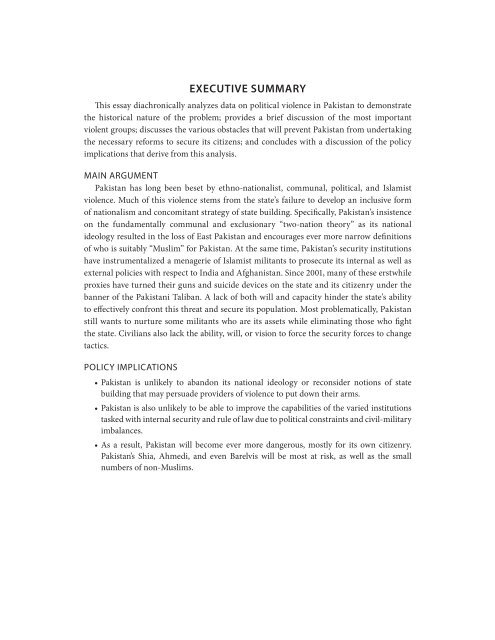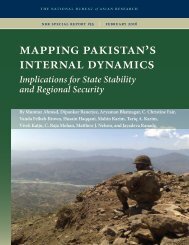pakistan’s
SR55_Mapping_Pakistan_February2016
SR55_Mapping_Pakistan_February2016
You also want an ePaper? Increase the reach of your titles
YUMPU automatically turns print PDFs into web optimized ePapers that Google loves.
EXECUTIVE SUMMARY<br />
This essay diachronically analyzes data on political violence in Pakistan to demonstrate<br />
the historical nature of the problem; provides a brief discussion of the most important<br />
violent groups; discusses the various obstacles that will prevent Pakistan from undertaking<br />
the necessary reforms to secure its citizens; and concludes with a discussion of the policy<br />
implications that derive from this analysis.<br />
MAIN ARGUMENT<br />
Pakistan has long been beset by ethno-nationalist, communal, political, and Islamist<br />
violence. Much of this violence stems from the state’s failure to develop an inclusive form<br />
of nationalism and concomitant strategy of state building. Specifically, Pakistan’s insistence<br />
on the fundamentally communal and exclusionary “two-nation theory” as its national<br />
ideology resulted in the loss of East Pakistan and encourages ever more narrow definitions<br />
of who is suitably “Muslim” for Pakistan. At the same time, Pakistan’s security institutions<br />
have instrumentalized a menagerie of Islamist militants to prosecute its internal as well as<br />
external policies with respect to India and Afghanistan. Since 2001, many of these erstwhile<br />
proxies have turned their guns and suicide devices on the state and its citizenry under the<br />
banner of the Pakistani Taliban. A lack of both will and capacity hinder the state’s ability<br />
to effectively confront this threat and secure its population. Most problematically, Pakistan<br />
still wants to nurture some militants who are its assets while eliminating those who fight<br />
the state. Civilians also lack the ability, will, or vision to force the security forces to change<br />
tactics.<br />
POLICY IMPLICATIONS<br />
• Pakistan is unlikely to abandon its national ideology or reconsider notions of state<br />
building that may persuade providers of violence to put down their arms.<br />
• Pakistan is also unlikely to be able to improve the capabilities of the varied institutions<br />
tasked with internal security and rule of law due to political constraints and civil-military<br />
imbalances.<br />
• As a result, Pakistan will become ever more dangerous, mostly for its own citizenry.<br />
Pakistan’s Shia, Ahmedi, and even Barelvis will be most at risk, as well as the small<br />
numbers of non-Muslims.



